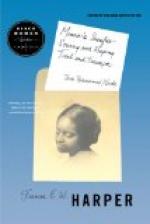in the dust. With such an ante-natal history
how much she needed judicious, but tender, loving
guidance. In that restless, sensitive and impulsive
child was the germ of a useful woman with a warm,
loving heart, ready to respond to human suffering,
capable of being faithful in friendship and devoted
in love. Before that young life with its sad inheritance
seemed to lay a future of trial, and how much, humanly
speaking, seemed to depend upon the right training
of that life and the development within her of self-control,
self-reliance and self-respect. There was no
mother’s heart for her to nestle upon in her
hours of discouragement and perplexity; no father’s
strong, loving arms to shelter and defend her; no
sister to brighten her life with joyous companionship,
and no brother to champion her through the early and
impossible period of ripening womanhood. Her
grandmother was kind to her, but not very tender and
loving. Her struggle to keep the wolf from the
door had absorbed her life, and although she was neither
hard nor old, yet she was not demonstrative in her
affections, and to her a restless child was an enigma
she did not know how to solve. If the child were
hungry or cold she could understand physical wants,
but for the hunger of the heart she had neither sympathy
nor comprehension. Fortunately Annette had found
a friend who understood her better than her grandmother,
and who, looking beneath the perverseness of the child,
saw in her rich possibilities, and would often speak
encouragingly to her. Annette early developed
a love for literature and poetry and would sometimes
try to make rhymes and string verses together and
really Mrs. Lasette thought that she had talent or
even poetic genius and ardently wished that it might
be cultivated and rightly directed; but it never entered
the minds of her grandmother and aunts that in their
humble home was a rarely gifted soul destined to make
music which would set young hearts to thrilling with
higher hopes and loftier aspirations.
Mrs. Lasette had been her teacher before she married.
After she became a wife and mother, instead of becoming
entirely absorbed in a round of household cares and
duties, the moment the crown of motherhood fell upon
her, as she often said, she had poured a new interest
into the welfare of her race.[1] With these feelings
she soon became known as a friend and helper in the
community in which she lived. Young girls learned
to look to her for council and encouragement amid
the different passages of their [lives?] sometimes
with blushing cheeks they whispered in to her ears
tender secrets they did not always bring to their near
relatives, and young men about to choose their life
work, often came to consult her and to all her heart
was responsive. With this feeling of confidence
in her judgment, Mr. Thomas had entered her home after
leaving Mrs. Harcourt’s, educating himself for
a teacher. He had spent several years in the
acquisition of knowledge and was proving himself an




